
Domestic Lumber
Alder
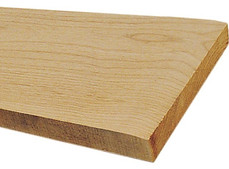
Natural consistency and beautiful color can give the visual appeal of cherry, maple or birch. Alder dries to an even honey tone and can be finished to resemble more expensive fine-grained species. There is little color variation between the heartwood and sapwood, making alder also perfect for light or natural finishes. Alder's popularity continues to grow among fine furniture and cabinetry makers worldwide.
Ash
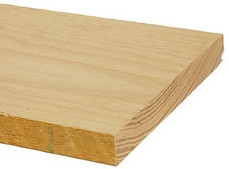
American Ash has an excellent shock resistance, and along with Hickory, it is one of the most commonly used hardwoods for tool handles in North America. When stained, ash can look very similar to Oak, although oaks have much wider rays, which are visible on all wood surfaces — even on flat sawn surfaces, where they appear as short, thin brown lines between the growth rings. Ashes lack these conspicuous rays.
Aspen

Aspen grows in the USA and Canada and is related to cottonwood and Canadian Poplar. Aspen is whitish to creamy gray in color with a straight, even and fine grain pattern. Aspen is soft and light in weight making it an excellent choice for the cores of veneer core plywood. Machining and finishing properties are only fair because of the wooly grain that sometimes appears in Aspen.
Basswood
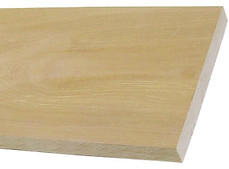
Basswood is a premier carving and turning hardwood and a preferred species among high-end shutter manufacturers.Basswood is also a top choice for musical instruments, specialty products and millwork. The sapwood of basswood is creamy white in color, merging into the heartwood, which is pale to reddish brown, sometimes with darker streaks. The wood has a fine uniform texture and indistinct grain.
Beech

American Beech is sometimes under-appreciated, which may be due to its bland appearance. Yet considering its decent strength and hardness—and its comparatively low cost—Beech represents an excellent value for woodworkers.
Cherry

Our Cherry is valued for its rich, deep reddish Brown color and exceptional character. Its interesting grain and smooth texture give it extraordinary finishing qualities.
Hickory
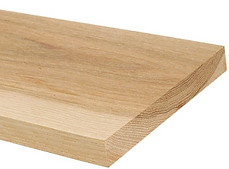
Hickory is an exceptionally strong, dense and durable Specie of hardwood, found growing throughout the United States. Hickory features white sapwood and contrasting pink to brown heartwood, often giving it a 'calico' appearance prized by woodworkers and designers. Not to be overlooked, Hickory-smoke also provides the best-tasting barbecues known to mankind.
Soft Maple
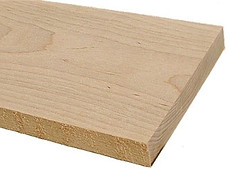
Soft Maple (or "Red Maple") is not soft, as its name would imply. On the contrary, Soft Maple is twice as hard as Poplar, putting it at the same hardness level as Cherry. Soft Maple is valued for its bright white sapwood and reddish-brown heartwood, and readily receives stains or clear-coat to enhance its natural beauty. The term “Soft Maple” does not refer to any specific species of maple, it’s a broad term which includes several different species of maple. The term is merely used to differentiate these species from Hard Maple, which refers to a single species: Acer saccharum.
Hard Maple

Hard Maple is creamy white with a slight reddish brown tinge and the heartwood varies from light to dark reddish brown. The amount of darker brown heartwood can vary significantly according to growing region. Both sapwood and heartwood can contain pith fleck. The wood has a close fine texture and is generally straight grained, but it can also occur as “curly”, “fiddleback”, and “birdseye” figure.
Red Oak

This very attractive, hard and heavy lumber is widely used throughout the world in furniture, flooring, cabinetry, joinery and architectural millwork. The wood is mostly straight-grained with a coarse texture and slightly less pronounced figure compared to white oak. Our red oak lumber comes from both the Glacial and Appalachian regions. All are graded after kiln drying and planing and offer unique quality consistency compared to commodity oak products. We sort our Glacial and Appalachian red oak by color to help reduce waste and produce cabinets and furniture with beautiful, uniform color tones.
White Oak
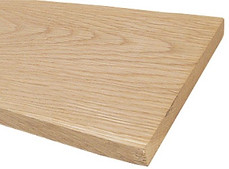
White Oak is a strong, hard, versatile lumber, white oak is a favorite in furniture, flooring, doors, kitchen cabinets, millwork and even railway sleepers; is strong, beautiful, rot-resistant, easy-to-work, and economical, representing an exceptional value to woodworkers. Long favored in Europe, US white oak is similar in color and appearance to European oak. The sapwood is light colored and the heartwood is light to dark brown. White oak has more figure than red oak, with a distinctive open grain and coarse texture. We offer white oak lumber from two regions, Appalachian and Glacial.
Poplar
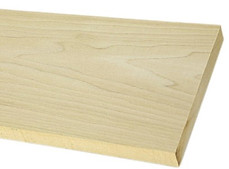
Poplar is a fine-grained, highly-versatile specie with excellent working properties, and is easily stained to resemble other hardwoods. Poplar is one of the most common utility hardwoods in the United States. Though the wood is commonly referred to simply as “Poplar,” it is technically not in the Populus genus itself, (the genus also includes many species of Cottonwood and Aspen), but is instead in the Liriodendron genus, which is Latin for “lily tree.” The flowers of this tree look similar to tulips, hence the common alternate name: Tulip Poplar.
Walnut
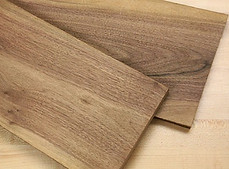
Considered the elite of the American hardwoods, Walnut is the favourite of the darker woods. Walnut grows in widely scattered stands throughout the eastern half of the United States, primarily in the Midwest. The species is generally coarse textured and produces distinctive grain patterns. Walnut is prized for high-end furniture, architectural interiors, cabinets, doors, flooring and paneling. A favored use in contrast with lighter species, walnut is always distinctive. Walnut manufactures and stains well and can be polished to an exceptional finish.
